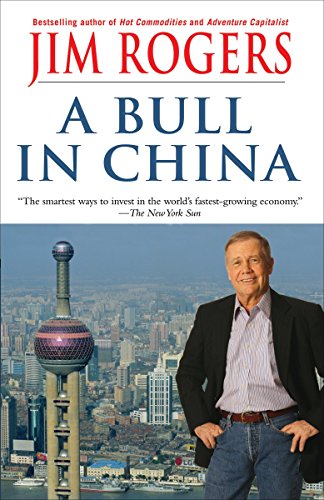It’s 29 degrees Celsius, humidity has just edged past 93 per cent and Jim Rogers is at home pedalling away on his exercise bike. ”That’s the tropics,” he says. ”It’s hot and it rains.” Within five minutes a torrential downpour arrives to underscore his point.
His Asian admirers, of which there are many, would say he even gets the weather forecast right. Rogers does not have an iPod; instead a laptop computer is mounted on the handlebars, so he can keep an eye on the market.
In 1988 Rogers became the first Westerner, possibly the first person, to ride a motorbike across China. He did it again in 1990 and then in a car, with his wife, Paige Parker, in 1999 — on a round-the-world journey that included 5½ weeks travelling, west to east, across Australia.
 A Bull in China: Inves...
Best Price: $3.50
Buy New $9.57
(as of 11:55 UTC - Details)
A Bull in China: Inves...
Best Price: $3.50
Buy New $9.57
(as of 11:55 UTC - Details)
”These trips brought home to me,” he says, ”that China was not a communist country. They were not horrible bloodthirsty people, they were extremely hardworking people. Despite what they called themselves, they were capitalists.”
Four decades ago — in the home of modern capitalism — Rogers partnered with George Soros to establish one of the most successful hedge funds of all time. ”A couple of us started a fund and it was successful,” he says, sounding almost embarrassed about that success.
The Quantum Fund wasn’t just successful; over the decade in which Rogers was involved, the S&P 500 advanced 47 per cent — while Rogers and Soros managed returns of 4200 per cent.
 A Gift to My Children:...
Best Price: $1.68
Buy New $6.73
(as of 02:10 UTC - Details)
A Gift to My Children:...
Best Price: $1.68
Buy New $6.73
(as of 02:10 UTC - Details)
”In 1974, there was something called the Nifty Fifty,” Rogers says. ”They were supposedly the 50 great stocks that would have rising earnings forever. They all sold at huge multiples of their earnings, they were just very, very expensive stocks and we shorted a lot of them.”
Rogers, who today mainly invests in commodities and currencies, again began shorting stocks about a month ago.
His assessment is that China and the US are heading in different directions. The big difference is the direction in which they’re headed.
”China is one of the best-run countries in the world right now,” he says, ”and that’s just based on results. They call themselves communists but they’re among the best capitalists in the world.”
China has many problems, he admits, including a blocked currency which has helped create an internal property bubble as increasingly wealthy investors have few options for parking their funds.
 Hot Commodities: How A...
Best Price: $1.25
Buy New $8.95
(as of 01:40 UTC - Details)
Hot Commodities: How A...
Best Price: $1.25
Buy New $8.95
(as of 01:40 UTC - Details)
But, he argues, the problems of the US are far greater. Rogers has been a strident critic of America’s massive bailout packages, its architects and its beneficiaries.
”Karl Marx is probably dancing somewhere,” he says with a grin. ”Because, in America right now, the government owns the automobile industry, the insurance industry, the mortgage industry and the banking industry. The government suddenly owns huge parts of the American economy — that’s what Karl Marx said he wanted, and he didn’t have to fire a shot.”
As for Australia, he says: ”The only disappointment I’ve had is that your politicians are as bad as the ones in America.
If the Australian government keeps running up such gigantic debts, the lucky country is going to run out of luck.”
Rogers, who supports neither side of politics in the US, is highly critical of the Rudd government’s spending policies and sees no logic behind its decision to impose a super profits tax on the resources sector. ”Further taxing resources is not going to bring out new supply, so it will hurt us all in the long run,” he argues.
”Do you think politicians are going to find new supplies, much less develop them? If your government insists on taxing the golden goose, it should at least pay off debt so when the bad times come Australia will suffer less.”
But Rogers has praise for the Reserve Bank under its governor, Glenn Stevens. ”I wish your central bank was running the US Federal Reserve,” he says bluntly. ”Your guys have done a much better job than most other central banks. I didn’t say they’re doing a great job; still, it’s a much better job.





